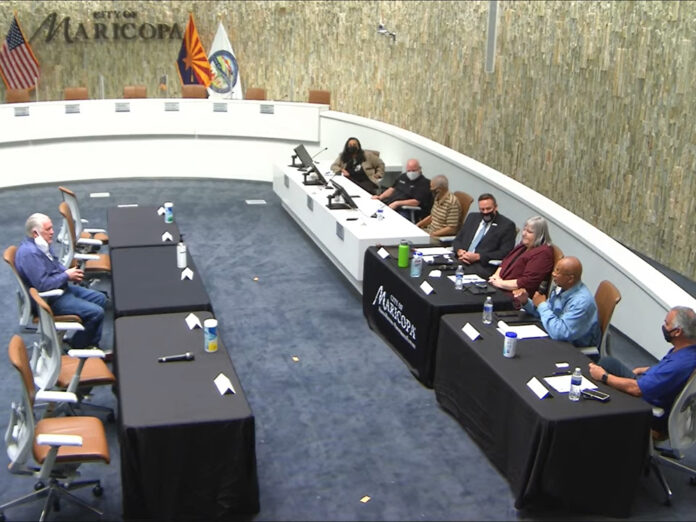
The City of Maricopa does not have a good relationship with the board of the Maricopa Consolidated Domestic Water Improvement District.
That played out visually Tuesday when a city council invitation to the water district board for a special meeting drew only one member. Chairman Dean Scott faced the council alone, saying he was there probably against the wishes of his board.
City Councilmember Marvin Brown, who has been the council’s de facto water expert, was clearly put out by the district’s response, calling it an affront and lack of respect.
“It’s insulting that you’re here by yourself and they didn’t show up,” Brown said.
Scott brought up the deep-seated distrust the board has toward the city, though he could not point to the origin.
“Ever since this process started, I think, there has been some contention,” Scott said. “I’d like to see that go away and be more open and honest with each other. I think we can do that.”
The water district, formed in 1986, provides water to the oldest section of town in part of the Heritage District. Forging a new relationship between the two entities is important for the future of that area. For the City, at least, it’s all about flow.
While city councilmembers emphasized consistent hydrant flow for public safety, the elephant in the room was ongoing development. The arrival of commercial builders for Sonoran Creek Marketplace, with Sprouts and Brake Masters, and Maricopa Towne Plaza, with Iconic Tire and Maricopa Animal Hospital, has made City Hall antsy about a guaranteed water supply.
In February, City Manager Rick Horst participated in a water district meeting but was not warmly received. He described the City’s proposal to take over the operations at the time, and the city council reiterated the idea at Tuesday’s meeting.
The water district is a taxing authority and charges in-district and out-of-district rates for its water. Since the City incorporated in 2003, officials have eyed the district and its capacity for water supply and fire suppression.
“Nobody wants to see anybody rely on something and then not have it,” Mayor Christian Price said.
THE PROPOSAL
The City of Maricopa’s intent is to take over operations of the water district, hire the district’s personnel, assume the debt, contract with property owners to maintain current water rates, improve/extend infrastructure and possibly turn over management to Global Water.
The rates would not be “fixed,” Price said, because there are allowances for federal mandates, inflation and other variables, but any increases would be “minimal.”
In the process, the Maricopa Consolidated DWID would no longer be a taxing district. Its property owners currently pay a DWID tax rate of 3.37%, but that would be eliminated.
Vice Mayor Nancy Smith said she was baffled about the district’s apprehension over the terms. Councilmember Henry Wade said it needs to be clear to the water district board that the City is offering “something different” from previous agreements and the board will be working with different people.
HITTING SNAGS
Over the years, the district board has shunned talk of the City taking over, and city officials have complained about the quality of the water resource. The district has questioned the validity of an intergovernmental agreement (IGA) signed in 2008, when the late Don Pearce, former fire chief, was chairman of the district board.
Price said the city has the IGA paperwork with six signatures.
“We felt like we had an IGA and that IGA wasn’t exactly being honored,” he said.
Among other things, that IGA gave Maricopa Fire access for emergencies and training, and the city paid rent for district offices (until the district moved without telling city officials).
The fire department has complained about inconsistent flow from hydrants in the district. It wants to be assured of having the same flow whether firefighters are hooked to a Global Water hydrant or a Maricopa Consolidated DWID hydrant, especially if using both for the same fire.
“How does one fire hydrant produce such a maximum flow and another fire hydrant just up the way doesn’t produce a flow, at least not anywhere near the other one?” Price said. “You would imagine that something that’s all linked together in a pressurized system would have similar flow in similar areas. Not always true.”
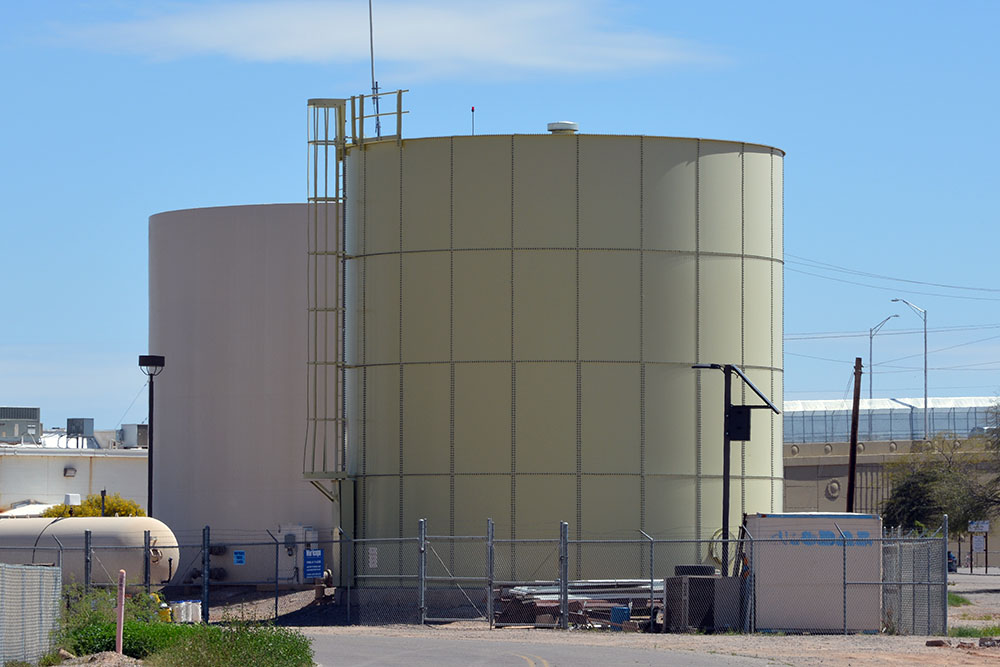
That has ruffled feathers at the water district. Its personnel have argued it is not required to provide water protection because it is not a fire district. It has also argued it meets or exceeds the standards for flow tests on new commercial pads.
But Price said a residence has different standards of fire flow than a multi-story commercial complex. And considering the hydrants have already been in use for fire flow, removing that reliance could involve liability for both the district and the city, he said.
The purpose of trying to get the City and Maricopa Consolidated DWID on the same page is create a contractual obligation to “find ways to solve these flow problems,” Price said.
“The way I understand it, the fire hydrants are all good or exceeded some of the requirements,” Scott said. “So, that’s one thing we both need to work on. Probably go back and redo all those tests and make sure that what we see is what’s really there.”
Price said each test by an independent reviewer costs money. Vitiello estimated $550 per test. He also said the City and the district would have to agree to the standards of the fire code, which has been a sticking point.
AN ALTERNATIVE
Smith suggested that, instead of doing a series of hydrant tests to see who’s right or wrong, the City and the district develop a level of mutual confidence.
“Let’s just get to the point where we have that relationship, and you trust us, and we can move forward with the idea that the City can provide the infrastructure,” she said. “That they have the funds to provide the things that are needed within that water district.”
She said that level of trust would make the call for hydrant testing a moot point. Scott indicated he would take that back to his board.
OPEN AND HONEST
Another sticking point for the City was transparency. The special meeting was public and recorded. Price said it was important that Maricopa Consolidated DWID also be transparent by fulfilling public records requests and having open meetings.
“As a taxing authority, transparency is a must,” Price said. “Public records requests have to be honored. That means access to any information that has been requested.”
Price said the water board, in a letter declining to attend Tuesday’s meeting, invited the mayor or any interested council member to come and talk to them in executive (closed) session.
“I’m not sure that legally it passes the smell test,” Price said. “There are very specific rules that e-session can say or not say as to what you can do or not do.”
He said the board was invited to the special meeting so it would be public and transparent. He said he would accept but wasn’t sure of the legal parameters.
“I’m not sure how it can be done either,” Scott said, “but I think it needs to be done somehow, however legally it can be done.”
If independent hydrant testing is done, Price said, it has to be random hydrants, not just one hydrant selected by the district.
Scott was hesitant to give the council advice on how to reach out to the water board.
Vitiello suggested inviting the water board again to a conversation but with all the offers discussed at the Tuesday meeting outlined for discussion. Price said he wants to turn that around quickly because of the elements involved.
“I feel like public safety is the No. 1, utmost important thing,” Smith said. “Economic development is important to us, but to me that’s second priority to be making sure that our residents are safe, that our businesses there are safe.”
“It’s not only about the fire and public safety, it’s about what’s going to happen there over time,” Councilmember Vincent Manfredi said. “And there’s a lot that’s going to happen there over time.”



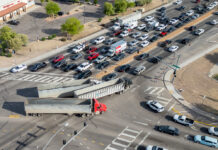

![Maricopa’s ‘TikTok Rizz Party,’ explained One of several flyers for a "TikTok rizz party" is taped to a door in the Maricopa Business Center along Honeycutt Road on April 23, 2024. [Monica D. Spencer]](https://www.inmaricopa.com/wp-content/uploads/2024/04/spencer-042324-tiktok-rizz-party-flyer-web-218x150.jpg)
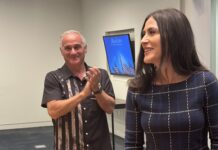

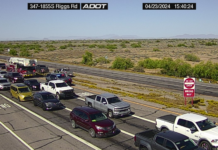



![Alleged car thief released without charges Phoenix police stop a stolen vehicle on April 20, 2024. [Facebook]](https://www.inmaricopa.com/wp-content/uploads/2024/04/IMG_5040-218x150.jpg)




